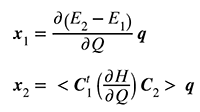ქიმიის ტერმინთა განმარტებითი ლექსიკონი
- ინგლისურ-ქართული
- ქართულ-ინგლისური
- ლექსიკონის შესახებ
- გამოხმაურება

| branching plane | განშტოების სიბრტყე |
| At a conical intersection point, the plane spanned by the gradient difference vector (x1) and the gradient of the interstate coupling vector (x2):
Where C1 and C2 are the configuration interaction eigenvectors (i.e., the excited and ground-state adiabatic wavefunctions) in a conical intersection problem, H is the conical intersection Hamiltonian, Q represents the nuclear configuration vector of the system, and thus q is a unit vector in the direction of vector q. E1 and E2 are the energies of the lower and upper states, respectively. Note: The branching plane is also referred to as the g-h plane. Inspection of x1 and x2 provides information on the geometrical deformation imposed on an excited state molecular entity immediately after decay at a conical intersection. Consequently, these vectors provide information on the ground-state species that will be formed after the decay. |
სიბრტყე კონუსური გადაკვეთის წერტილში, რომელიც მოიცავს გრადიენტთა სხვაობის ვექტორს (x1) და შორის კავშირის ვექტორის გრადიენტს (x2):
სადაც C1 და C2 არის კონფიგურაციის ურთიერთქმედების საკუთარი ვექტორები (ანუ აღგზნებული და ძირითადი მდგომარეობის ადიაბატური ტალღური ფუნქციები) კონუსური გადაკვეთის პრობლემაში, H არის ჰამილტონის კონუსური კვეთა, Q წარმოადგენს სისტემის ბირთვული კონფიგურაციის ვექტორს და, შესაბამისად, q არის ერთეული ვექტორი q ვექტორის მიმართულებით. E1 და E2 არის, შესაბამისად, ქვედა და ზედა მდგომარეობების ენერგიები. შენიშვნა: განშტოების სიბრტყეს ასევე მოიხსენიებენ როგორც g-h სიბრტყეს. x1 და x2 გამოკვლევა გვაწვდის ინფორმაციას აღგზნებულ მდგომარეობაში მოლეკულურ ერთეულზე დაწესებული გეომეტრიული დეფორმაციის შესახებ კონუსურ კვეთაზე დაშლისთანავე. შესაბამისად, ეს ვექტორები გვაწვდიან ინფორმაციას ძირითადი მდგომარეობის ნაწილაკებზე, რომლებიც ჩამოყალიბდებიან დაშლის შემდეგ. |
| Source | წყარო: PAC, 2007, 79, 293 (Glossary of terms used in photochemistry, 3rd edition (IUPAC Recommendations 2006)) on page 309 |
|









